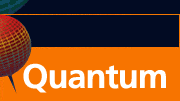CONTACTS
- Coordinator
Sebastian Deffner
-
Quantum Lunch Location:
T-Division Conference Room, TA-3,
Building 123, Room 121
 |


Quantum Institute: Visitor Schedule
The Quantum Lunch is regularly held on Thursdays in the Theoretical Division Conference Room, TA-3, Building 123, Room 121.
The organizing committee includes Malcolm Boshier (P-21), Diego Dalvit (T-4), Michael Di Rosa (C-PCS), Sebastian Deffner (T-4 & CNLS), Changhyun Ryu (P-21) , Nikolai Sinitsyn (T-4), Rolando Somma (T-4), Christopher Ticknor (T-1), and Wojciech Zurek (T-4).
For more information, or to nominate a speaker, contact Sebastian Deffner.
To add your name to the Quantum Lunch email list, contact Kacy Hopwood.
Thursday May 26, 2016
12:30 PM - 2:00 PM
Speaker: Steve Campbell (Queen's University, Belfast)
Technical Host: Sebastian Deffner
TOPIC: The cost of achieving finite time adiabatic dynamics
Abstract
Recent years have witnessed a surge of interest in the study of thermal nanomachines that are capable of converting disordered forms of energy, such as heat, into useful work. It has been shown for both classical and quantum systems that external drivings can allow a system to evolve adiabatically even when driven in finite time, such techniques are commonly known as shortcuts to adiabaticity (STA) [1].
It was suggested to use such external drivings to render the unitary processes of a thermodynamic cycle quantum adiabatic, while being performed in finite time [2]. This could considerably augment the performance of nano-thermodynamic engines as work exchanges are extremised by adiabatic protocols. However, implementing additional external driving requires resources which affect the overall performance of the system [3].
We analyse the implications of considering the necessary power in applying these STA, subsequently showing that this cost may outweigh the possible gains in work extraction for slow enough processes due to the relative degree of adiabaticity in the dynamics, while for relatively faster processes, the use STA can improve the work exchange. Furthermore, we devise a general strategy that exploits the definition of work as a two-time measurement of energy to improve the performance of work transfer. In particular, we show that it is possible to achieve sizable energy savings by gathering information from the first measurement and then applying a specifically tailored driving to the protocol. We apply our framework to driving a critical many-body system through a quantum phase transition, where the closing of the energy gap at the critical point makes the driving Hamiltonian of increasing complexity [4] and show that this complexity necessitates a divergence in the cost of achieving finite time adiabatic dynamics.
References:
[1] Shortcuts to adiabaticity, E. Torrontegui, S. Ibáñez, S. Martínez-Garaot, M. Modugno, A. del Campo, D. Guéry-Odelin, A.
Ruschhaupt, Xi Chen, and J. G. Muga, Adv. At. Mol. Opt. Phys. 62, 117-169 (2013).
[2] More bang for your buck: Towards super-adiabatic quantum engines, A. del Campo, J. Goold, and M. Paternostro, Sci. Rep.
4, 6208 (2014).
[3] Cost of transitionless driving and work output, Yuanjian Zheng, Steve Campbell, Gabriele De Chiara, and Dario Poletti, arXiv:1509.01882.
[4] Shortcut to Adiabaticity in the Lipkin-Meshkov-Glick Model, S. Campbell, G. De Chiara, M. Paternostro, G. M. Palma, and R.
Fazio, Phys. Rev. Lett. 114, 177206 (2015).
|


